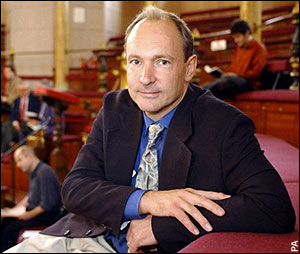"Web Science"
 Sir Timothy Berners-Lee, the British scientist who invented the World Wide Web, wants to turn the Internet into a science: Web science. In keeping with his vision, the Massachusetts Institute of Technology and the University of Southampton on Thursday announced the launch of the Web Science Research Initiative (WSRI), a panel that will understand the scientific, technical and social challenges underlying the growth of the Internet.
Sir Timothy Berners-Lee, the British scientist who invented the World Wide Web, wants to turn the Internet into a science: Web science. In keeping with his vision, the Massachusetts Institute of Technology and the University of Southampton on Thursday announced the launch of the Web Science Research Initiative (WSRI), a panel that will understand the scientific, technical and social challenges underlying the growth of the Internet.The WSRI will have its headquarters at the Computer Science and Artificial Intelligence Laboratory at MIT and at the School of Electronics and Computer Science at the University of Southampton. The WSRI will have four directors: Tim Berners-Lee, director of the World Wide Web Consortium; Wendy Hall, professor of computer science at University of Southampton; Nigel Shadbolt, professor of artificial intelligence at the University of Southampton; and Daniel J. Weitzner, principal research scientist at MIT. The two collaborating universities will raise funds from the corporate world and set up a research centre that will sponsor Ph.D. students and ultimately create undergraduate curricula in Web science.
In a recent article, Berners-Lee had said that the Web has changed the ways people communicate, collaborate, and educate. But with the Net evolving rapidly, it is necessary to understand its potential impact in the future too. He said that since humans are the creators of Web pages and links between them, their interactions form emergent patterns in the Web at a macroscopic scale. These human interactions are, in turn, governed by social conventions and laws. Web science, therefore, must be inherently interdisciplinary; its goal is to both understand the growth of the Web and to create approaches that allow new powerful and more beneficial patterns to occur.
Berners-Lee said that the social aspect of the Web demands that a field separate from computer science be explored. The WSRI members say that these social scientists and life sciences gurus can help study online communities and help 'Web scientists' understand how the Web operates and how it can be more responsive to the existing relationships people actually have online. The initiative will lead to better understanding of the Internet and will help improve the way people communicate, learn and work on the Internet.
Labels: internet


0 Comments:
Post a Comment
<< Home